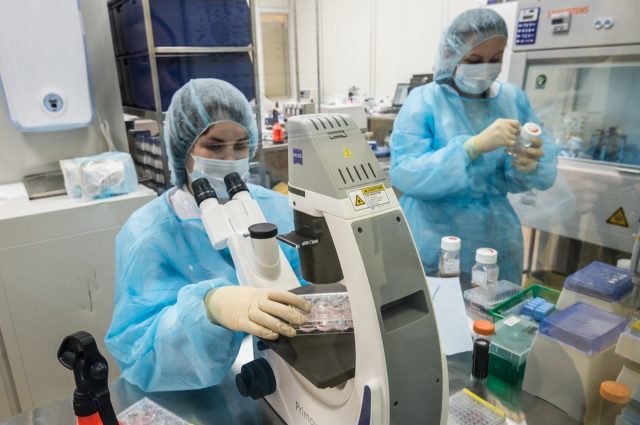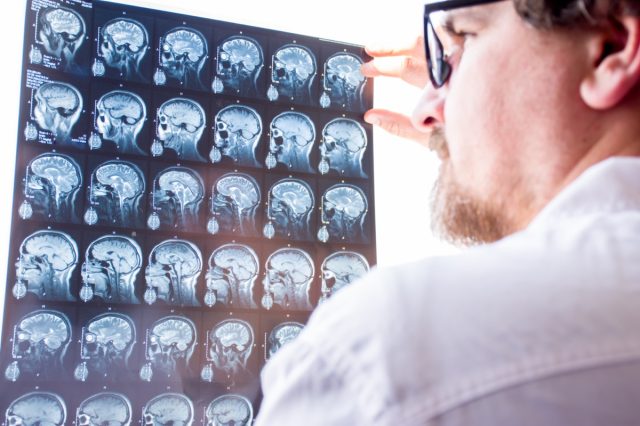Christina Applegate Reveals She Has Multiple Sclerosis

Christina Applegate is battling multiple sclerosis. The 49-year-old actress, who publicly battled breast cancer and insomnia, revealed her latest health struggle in a series of tweets on Tuesday. “Signs and symptoms of MS vary widely and depend on the amount of nerve damage and which nerves are affected. Some people with severe MS may lose the ability to walk independently or at all, while others may experience long periods of remission without any new symptoms,” reports the Mayo Clinic. Read on to hear about Christina Applegate’s MS battle and learn everything you need to know about the condition, from symptoms to look out for to how it is treated.
She Was Diagnosed ‘A Few Months Ago’

“Hi friends. A few months ago I was diagnosed with MS,” she wrote on Twitter. “It’s been a strange journey. But I have been so supported by people that I know who also have this condition. It’s been a tough road. But as we all know, the road keeps going. Unless some” jerk “blocks it.”
She Is Getting Treatment

Christina continued to explain that she is seeking treatment. “As one of my friends that has MS said ‘we wake up and take the indicated action’. And that’s what I do. So now I ask for privacy. As I go through this thing. Thank you xo.” Applegate co-starred in the film The Sweetest Thing, opposite Selma Blair, who also has MS. “I am disabled. I fall sometimes. I drop things. My memory is foggy. And my left side is asking for directions from a broken GPS,” Blair said once.
What Is MS?

Per the NIH, multiple sclerosis (MS) is a nervous system disease affecting your brain and spinal cord. “It damages the myelin sheath, the material that surrounds and protects your nerve cells. This damage slows down or blocks messages between your brain and your body, leading to the symptoms of MS,” they explain.
These Are the Symptoms of MS

The most common symptoms of MS include visual disturbances, muscle weakness, trouble with coordination and balance, sensations such as numbness, prickling, or “pins and needles,” and thinking and memory problems. “Usually, the disease is mild, but some people lose the ability to write, speak, or walk,” explains the NIH. Blair uses makeup as war paint. “I don’t mind if my muscles get caught at the intersection of a slow brain signal. I just want those words to come from lips covered in Chanel gloss,” she one said.
What Causes MS?

The cause of MS is unknown, but it may be an autoimmune disease, caused by your immune system accidentally attacking healthy cells in your body. “Most people with MS have a relapsing-remitting disease course. They experience periods of new symptoms or relapses that develop over days or weeks and usually improve partially or completely. These relapses are followed by quiet periods of disease remission that can last months or even years,” says the Mayo Clinic. “Small increases in body temperature can temporarily worsen signs and symptoms of MS, but these aren’t considered true disease relapses.”
Who Does MS Impact

Multiple sclerosis affects women more than men and often begins between the ages of 20 and 40.
“These factors may increase your risk of developing multiple sclerosis,” says the Mayo Clinic:
- “Age. MS can occur at any age, but onset usually occurs around 20 and 40 years of age. However, younger and older people can be affected.
- Sex. Women are more than two to three times as likely as men are to have relapsing-remitting MS.
- Family history. If one of your parents or siblings has had MS, you are at higher risk of developing the disease.
- Certain infections. A variety of viruses have been linked to MS, including Epstein-Barr, the virus that causes infectious mononucleosis.
- Race. White people, particularly those of Northern European descent, are at highest risk of developing MS. People of Asian, African or Native American descent have the lowest risk.”
How Is MS Diagnosed and Treated

There is no specific test for MS. Instead, doctors generally use medical history, physical exam, neurological exam, MRI, and other tests to diagnose it. Unfortunately, there is no cure for MS. However, symptoms can be slowed down and/or controlled with medications. Additionally, physical and occupational therapy may also help. Call your doctor if you feel you are at risk.




